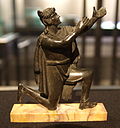The Germanic peoples were tribal groups who lived in Northern Europe in Classical Antiquity and the Early Middle Ages. In modern scholarship, they typically...
163 KB (20,237 words) - 12:30, 30 October 2024
Kappeln. Angeln is notable for being the original homeland of the Angles, a Germanic tribe that migrated from its original homeland in what is now Northern...
21 KB (2,358 words) - 12:30, 31 October 2024
bumblebees, it is modified to form a pollen basket, a bare shiny area surrounded by a fringe of hairs used to transport pollen, whereas in cuckoo bumblebees...
108 KB (11,622 words) - 18:02, 23 October 2024
Apple (category Articles containing Proto-Germanic-language text)
apple, whose Old English ancestor is æppel, is descended from the Proto-Germanic noun *aplaz, descended in turn from Proto-Indo-European *h₂ébōl. As late...
101 KB (10,240 words) - 08:18, 31 October 2024
Søften (section Pollen analysis)
2008 excavation were used in pollen analysis and showed that the pollen present was not indicative of wind-dispersed pollen (from trees for instance) and...
15 KB (1,827 words) - 09:31, 30 June 2024
moth comes from Old English moððe (cf. Northumbrian mohðe) from Common Germanic (compare Old Norse motti, Dutch mot, and German Motte all meaning 'moth')...
31 KB (3,115 words) - 13:15, 4 September 2024
Lombards). In the 4th and 5th centuries, the Germanic peoples finally overwhelmed the last remnants of the Limes. Pollen analyses from this period show that agriculture...
43 KB (5,948 words) - 05:29, 20 October 2024
Entheogenic use of cannabis (section Germanic paganism)
of prehistoric use of cannabis by Germanic peoples: The word hemp derives from Old English hænep, from Proto-Germanic *hanapiz, from the same Scythian...
36 KB (4,397 words) - 23:57, 20 October 2024
though autumn in a few pines), falling as soon as they have shed their pollen. The female cones take 1.5–3 years (depending on species) to mature after...
65 KB (4,690 words) - 18:43, 28 October 2024
deriving from Old English moððe (cf. Northumbrian dialect mohðe) from Common Germanic (compare Old Norse motti, Dutch mot and German Motte all meaning "moth")...
155 KB (16,853 words) - 17:39, 30 October 2024










